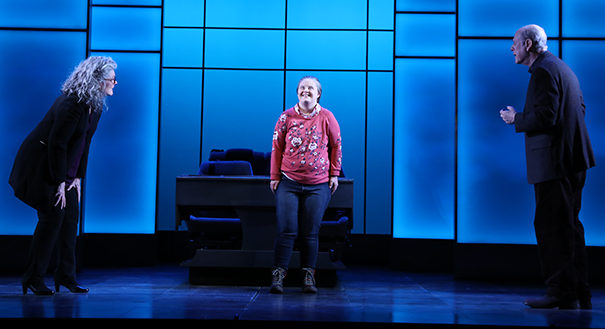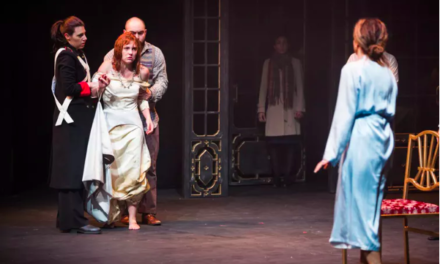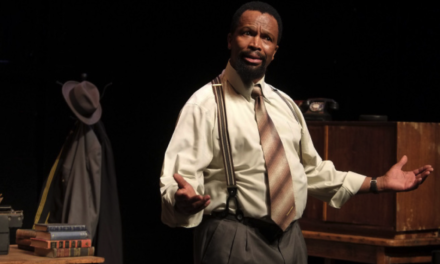What do you do with a disabled child you can’t emotionally support? While not the biggest question that Amy And The Orphans, by Lindsey Ferrentino, asks, it is certainly one of the more important ones. The short answer is: “put her in a state-run institution.” “Her” being Amy (Jamie Brewer), a woman with Down syndrome, the daughter of a young couple with two other children and a crumbling marriage.
While it might be “refreshing” to talk about disability during the first five minutes of a play, one of the only things to come out of doing so is the ancient notion that disabled people are people and not just things to pity and draw inspiration from. Not only does Ferrentino not use this opportunity to say something original and progressive about disability, she regresses by placing more emphasis on Amy’s siblings than on Amy.
The play opens with a scene between a young couple at a retreat who are trying to save their marriage. The wife, Sarah (Diane Davis), skirts around the idea of “not keeping” their toddler as if she were a cat they’d found abandoned in the road: Sarah’s tired, worried about the strangers who stare at Amy, and doesn’t want to be a good parent to one child while neglecting the other two. These reasons seem more akin to deciding to not have a third child than to disposing of one, already born, with a disability. If the couple had no other children, would they have kept Amy? The answer seems doubtful and indicates an overarching theme: non-disabled people are more important, more interesting, and more worthy of love and life than disabled people.
What makes these situations worse is that, later, Amy’s siblings discover that she was horribly abused at the first institution she was placed in–and that their parents knew about it and seemingly didn’t care.
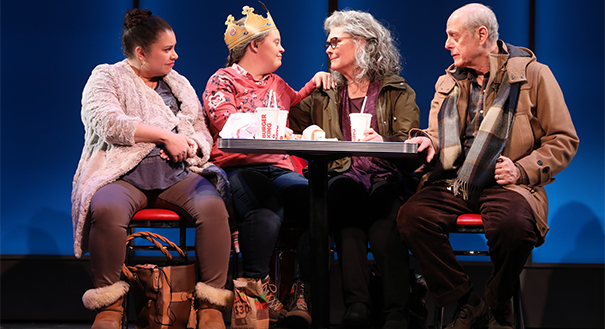
Amy And The Orphans at Roundabout’s Laura Pels Theatre | Photo Credits Joan Marcus
Ultimately, Amy’s parents choose her siblings over her, and they are the center of most of the play’s action. That Jake and Maggie have more stage time than Amy shows that this work is about the able-bodied and, thus, for the able-bodied more than it is about and for the disabled. This “non-disabled over disabled” narrative is present in all media and storytelling where disability is present; yet, here, it’s ironically juxtaposed with the theme that disabled people are people. So, which is the right answer? If disabled people are people, why should their stories get looked over?
The “disabled people are people” truth has been established since the 1960s and the Section 504 sit-in. Disability rights advocates (and even society itself) didn’t stop there, so why should theatre? We need to move on from this statement by normalizing disabled people in positions of power and in other positions where they are selected because of their skills, expertise, and personality–not their disability. A good starting point would be giving disabled people more stage time, having disabled actors play characters that are not written as having disabilities, and including disabled writers and directors to form stories from their point of view.
The show’s only redeeming character is Amy’s care attendant, Kathy (Vanessa Aspillaga), who is a comedic guide to state and group homes. Due to state law, she must accompany Amy as her guardian on the road trip the siblings take to their hometown of Montauk, and in doing so, she becomes an essential advocator for Amy and her autonomy. Kathy exemplifies how a good caregiver sees us: as we wish to be seen, in whatever way that may be.
Jamie Brewer plays the character of Amy well and brings both humor and rawness to the piece. Her down-to-earth nature and her constant utterances of movie quotes make her dynamic; but even though the play is named after her, she seems more like a sidekick or featured character in terms of stage time. In a play that tries to tackle the subjects of disability and oppression, why is she not the main character?
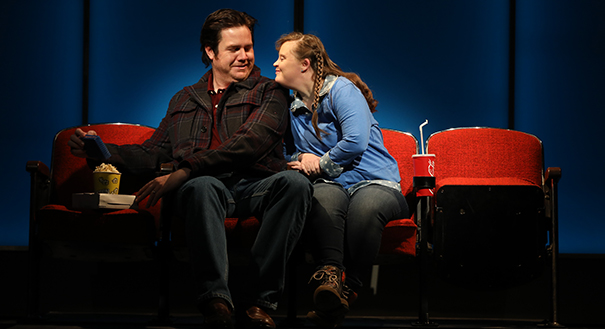
Amy And The Orphans at Roundabout’s Laura Pels Theatre | Photo Credits Joan Marcus
The end of the play shows that no one really knows Amy or what she could have been had her life not been a tumult of abuse and hardship. The final scene includes an abrupt curtain drop while Amy walks toward the front of the stage, away from a flashback in which she is at the movies with her father. Standing before the curtain and staring down the audience, she begins a speech of famous movie quotes that end in an uncomfortable but important climax:
“I’m a human being, goddamnit.
MY LIFE HAS VALUE.
You don’t understand.
I coulda been a contender.
I coulda been somebody.
I coulda been somebody.
I coulda been somebody.
I coulda been somebody.
. . .
. . .
Go ahead.
Make.
My.
Day.”
While some might see this scene as baffling and oddly placed, it is the equivalent of a fairytale narrator telling the children listening to the story its moral. In a play that shows the harsh realities of state-run institutions and group homes that many disabled children and adults get pushed into, we must be firmly woken up and shaken until it is widely understood that disabled people are merely people. Their lives have value if they’re taken for who they are and taught that they can do anything they want, which has to begin with parents and end with society.
The final scene of Amy And The Orphans is a calling, both literal and figurative. As Amy yells the final lines, she calls us to recognize that disabled people can do much more than they are given credit for and that they must be given a fair chance.
Yes, they are people; but this is a sentimental outlook, which damages those with disabilities by further perpetuating thoughts of pity. Nearly 50 years after Section 504 of the Rehabilitation Act of 1973 was passed, disabled people continue to be undermined and evaluated in terms of their disability. As prenatal testing continues to advance, will it be decided that all disability should be eradicated? It’s certainly being marketed as the easier option; the “harder” being treating everyone the same in all areas of life. This is an important first step in societal change, but the time has passed for that. Instead of merely stating this, let’s show it in our actions, like by including disabled people without having to boast about it.
Amy And The Orphans is playing at the Laura Pels Theatre in the Harold and Miriam Steinberg Center for Theatre on a limited engagement run through April 22, 2018. Tickets can be purchased by calling 212.719.1300 or visiting roundabouttheatre.org.
This post was written by the author in their personal capacity.The opinions expressed in this article are the author’s own and do not reflect the view of The Theatre Times, their staff or collaborators.
This post was written by Madison Parrotta.
The views expressed here belong to the author and do not necessarily reflect our views and opinions.

